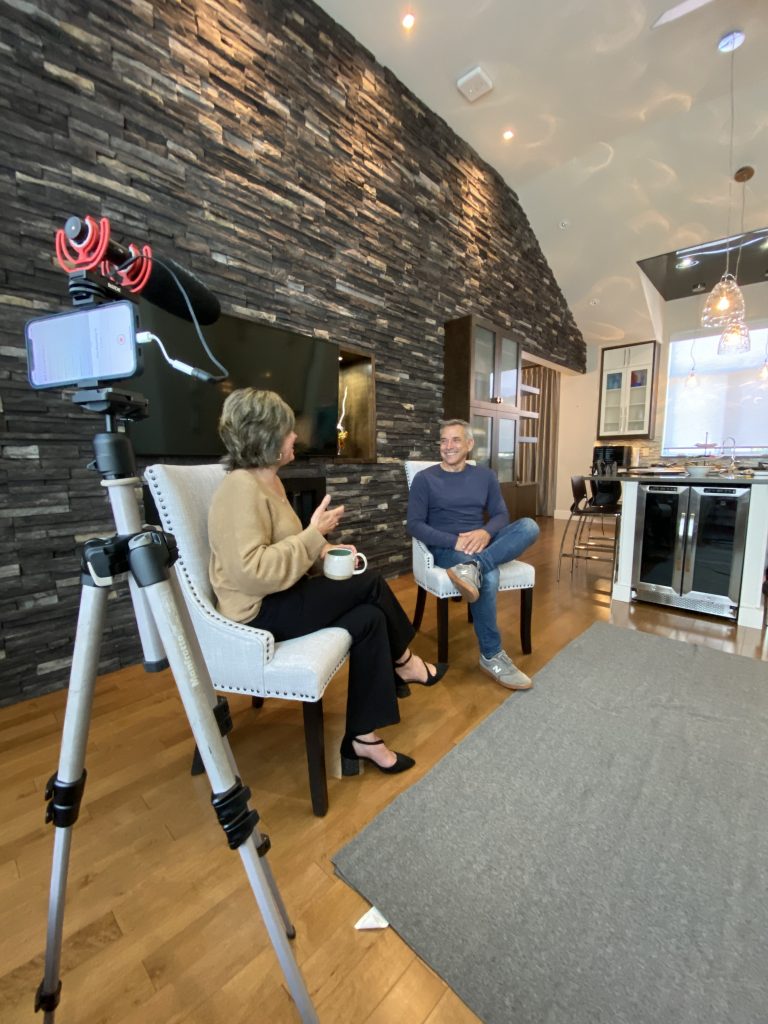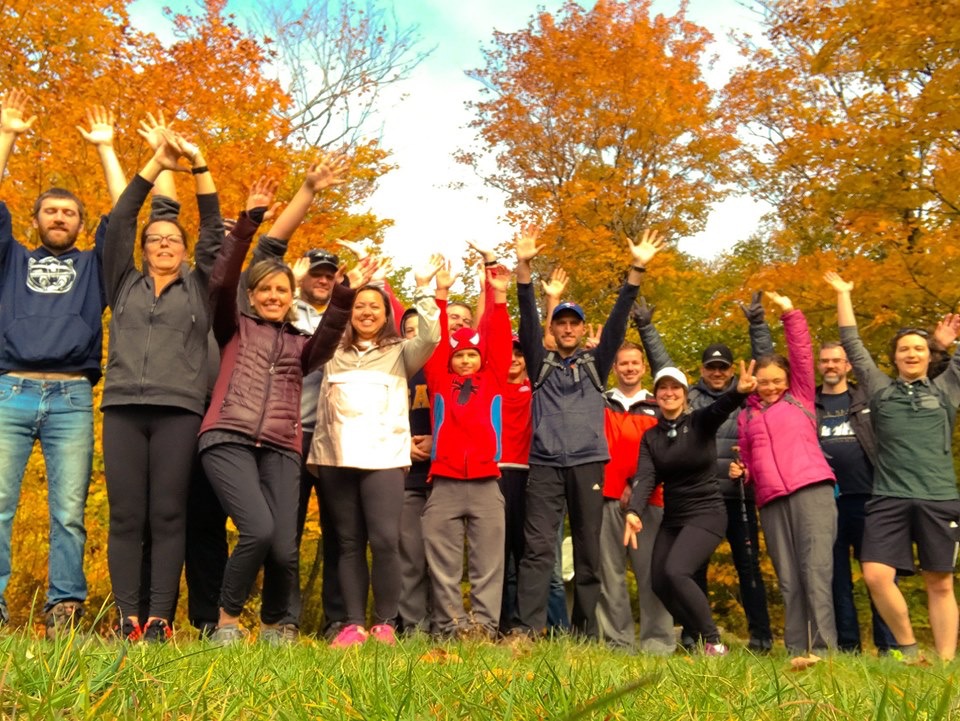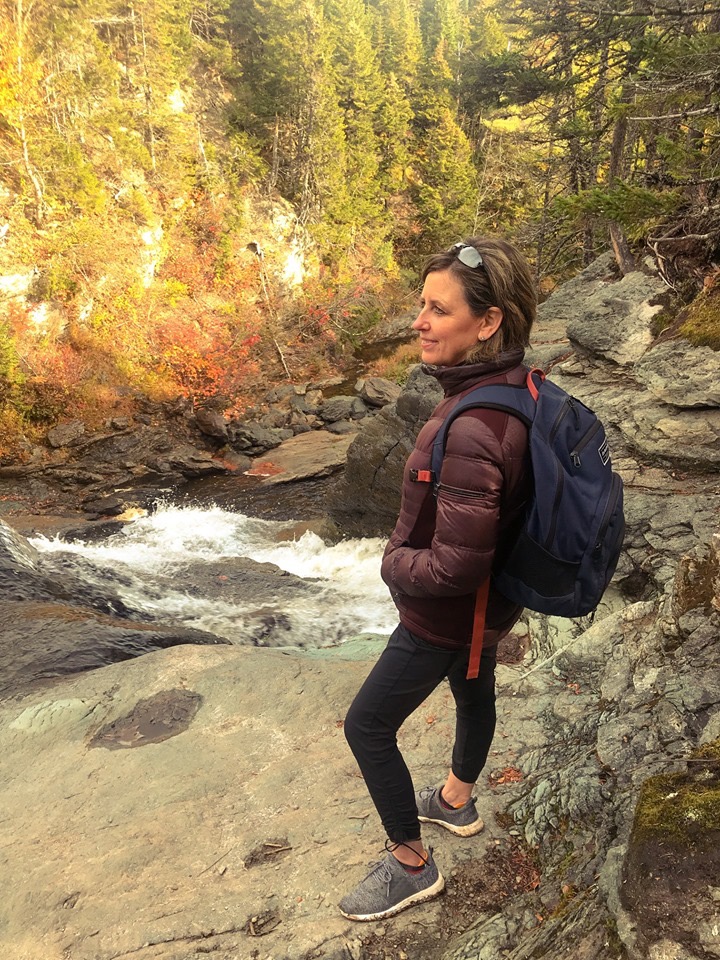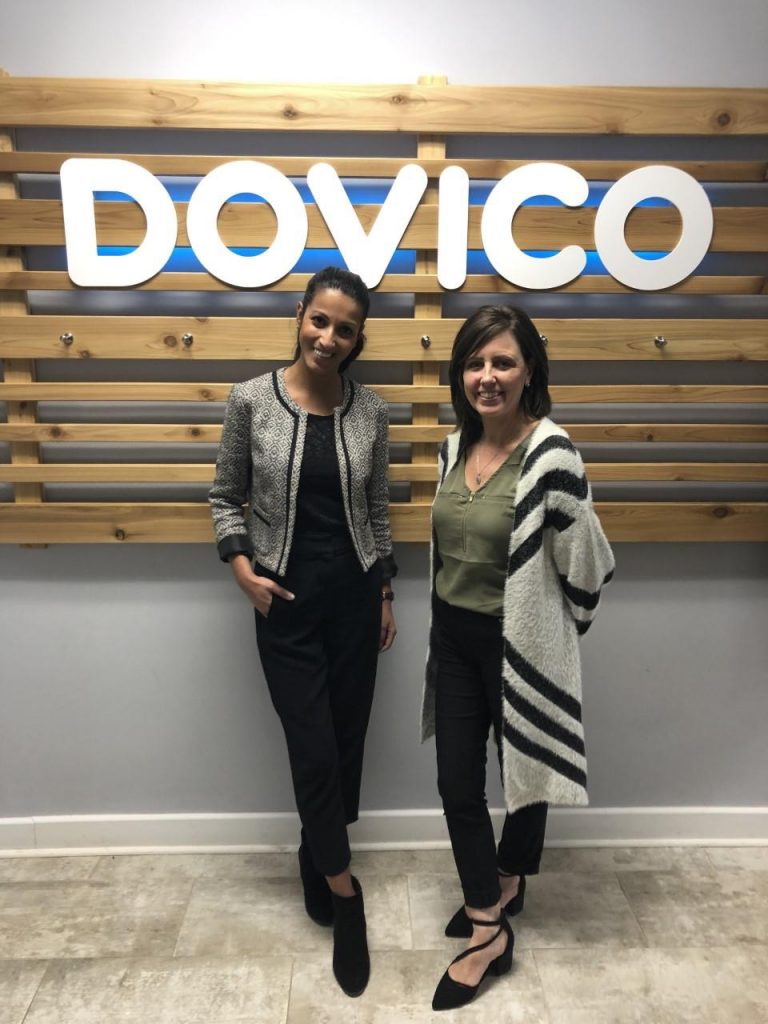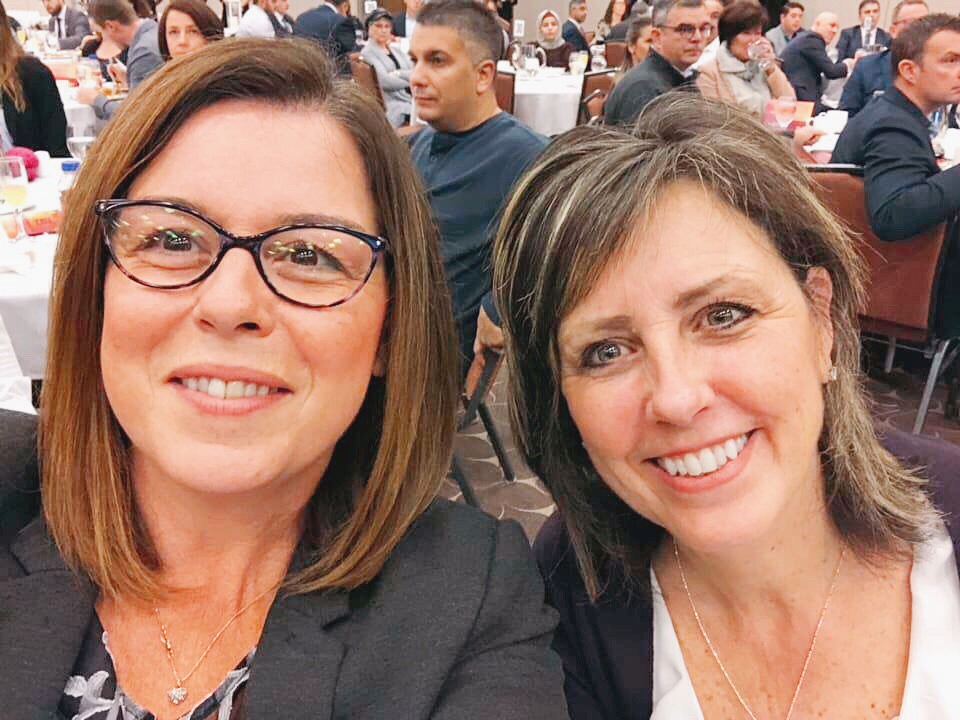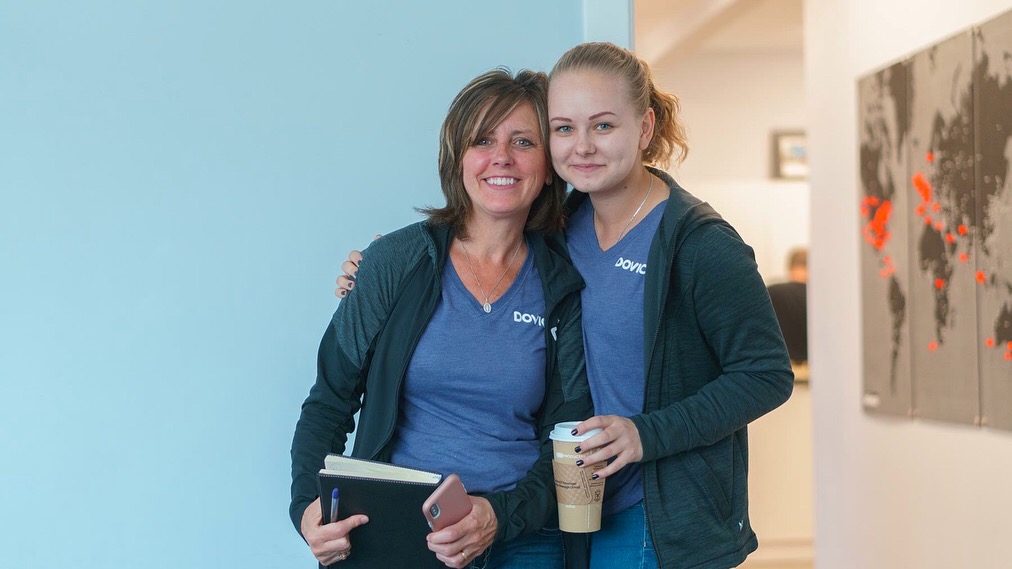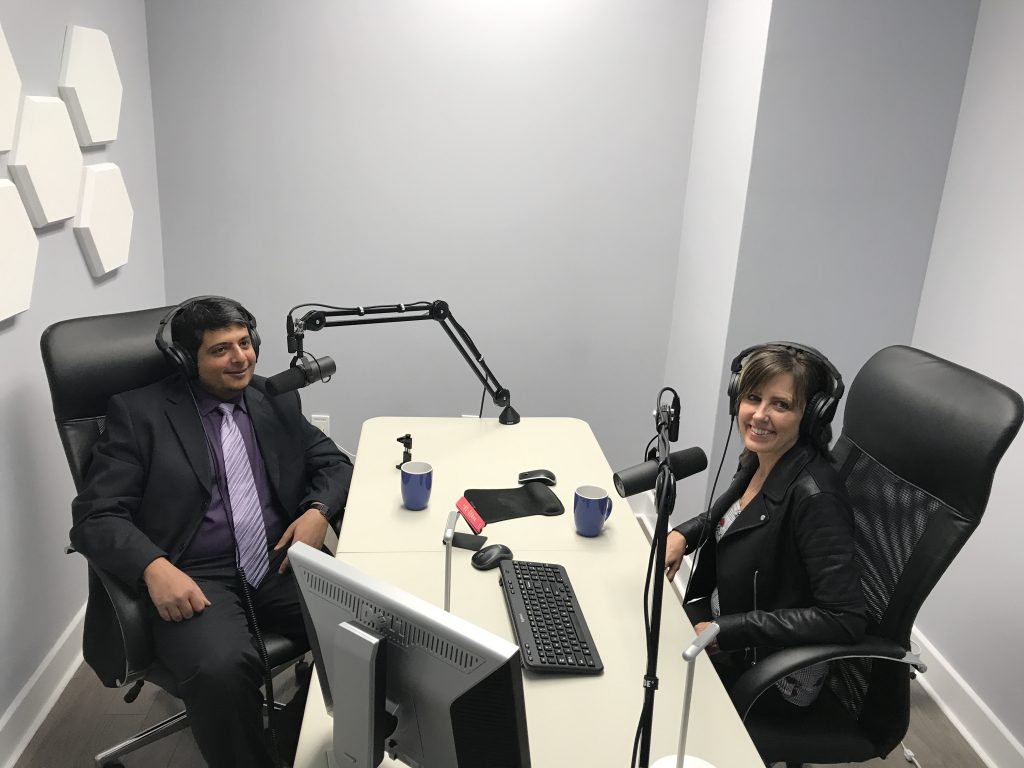Employee Spotlight is a series of biographies of Dovico employees that are meant to bridge that relatability gap. Dovico would be nothing more than just another timesheet company without the fantastic people who make up the team. This month we feature CoFounder and CFO, Diane Doucet. We hope you enjoy getting to know more about our Dovico team.
Who’s Diane Doucet? Diane is the CoFounder and CFO of Dovico.
She is “Employee #1” and co-founder of Dovico. Diane works tirelessly to ensure our company stays healthy, not only financially but environmentally so that every employee loves to come to the office.
“…having two brothers interested in engineering and developing ideas, and a father who loved technology got me interested in IT, which was a natural path to pursuing a bachelor’s degree in business with a major in computer science and then starting Dovico.” – Diane
(Podcast interview with co-founder and brother Yves Doucet)
Diane Doucet: Allo!
Yves Doucet: Allo! <Laugh>
Diane Doucet: Starting in French. Allo? Hi.
Yves Doucet: J’taime beaucoup. My sister Diane Doucet!
Diane Doucet: Your wife is also named Dianne Doucet.
Yves Doucet: Yeah, yeah.
Diane Doucet: Two ‘n’s.
Yves Doucet: Talk to me about your journey and how you didn’t start off being you know, an entrepreneur because I think you are a CFO. You started off by doing what, what did you do? What was your first job?
Diane Doucet: Before my job, I think my interest in it, or in this business was watching Star Trek. And to this day, I’d like to do a poll of how many people of age, watched Star Trek and are into it. I’m really interested in that. So I’ve been doing a verbal poll and I’m getting really good answers here. And I think that everybody in IT watched Star Trek who is my age, but I could be wrong. <Laugh> Did you watch that? You watched that and I know Pierre (our brother) watched it. You’re both engineers.
Yves Doucet: I tried Star Wars, all of that. Yeah
Diane Doucet: It is! It’s a thing. See my poll’s working. For me, I watched these guys and, what really stayed in my mind is the fact that they were so calm and they were all intelligent. Right. And using technology in ways that I had never seen before. You know, those little things that you tap and you’re transported somewhere. And boy did they seem to have good adventures, good journeys.
Yves Doucet: Who was your favorite character in Star Trek?
Diane Doucet: Oh, it was Spok, he was the calmest really, and most intelligent, so yeah. And they never got into arguments. They were just so calm about everything. So I found that really interesting, how you can be at war and such uncertainty and things like that, but still be so calm about everything
Yves Doucet: Is that why one of the logos of Dovico was like the Star Trek kind of thing?
Diane Doucet: It was, yeah, it looked like the logo. And even the ads, we had the ship
Diane Doucet: I think having two brothers interested in developing ideas and technology, my father also loved technology. We had a first computer, an Atari member. I think it was Atari. We played Pacman on it. Mm-Hmm <affirmative>, that was fun. I think all of that together got me interested in technology, and I’ve always liked it since then. For me, it was a natural path to Dovico, I didn’t really know back then in the day going into IT (Information Technology) for a woman was kind of different. I was consulted, in high school, and they told me, well, go and see a counselor. My highest notes were in math and chemistry. And, but my lowest one was in French and English and languages, but they told me to go into a secretarial <laugh>. So I thought, okay, that could be interesting. I don’t know what I want to do, so yeah, let’s try that. But I did know I wanted to go to university. So I went to the University of Shippagan and did a two-year course in administration.
Yves Doucet: Mm-Hmm <affirmative>
Diane Doucet: That was my start. And then I worked in an administration at the University of Moncton and then moved to Ottawa and worked for the federal government did work there for the judges and worked on the Meech Lake Accord. If knows what that is, <laugh> I unveiled the Diefenbaker statue in Ottawa and you know, shook hands with the prime minister at the time, Kim Campbell for a very short time, but that was interesting and did like some really nice different things there with the federal government. But I felt a little bit stuck at the federal government because I felt like I would want to do something different, but it was, it’s such a big organization, such a big wheel. I felt that anything I would do didn’t have much of an impact.
Yves Doucet: I remember there’s a French saying that says that, I would describe you as this « Boule qui roule n’amasse pas mousse ». <Laugh> you’re like an energetic bunny. You’re always moving. You’re always, okay. I gotta do something here. There’s something to be done. There’s always something to do. There’s always something that you can do. You know what I mean? You’re always looking for, okay, there’s something to do here. There’s something to do here. And you’re just stirring everything up and looking for opportunities. I think if I see you, what back then, when you were teenager <laugh>, you were always like, okay, there’s something to do here. A person to save or a person to help, there’s always something to do. When you were in Ottawa, you felt stuck. And you said that there’s something to do, which brought you here.
Diane Doucet: Then I decided to take a leave of absence and go back and finish my studies in business, but with a major in IT (Information Technology), because I saw that point in my life that I loved it, and I wanted to learn more about it. How do you link it to business? Was my thing in my head. How do you link all of that together? We have these big systems in the back, that work. How do you make that work with the business side? And they had this program at the University of Moncton. I never stopped studying. Even in Ottawa, I did a certificate in business admin back then, I decided to come back and finish my bachelor’s in it, it was called ‘Informatique de Gestion’.
Diane Doucet: This means basically a BA with a major in computer science, sort of. And within that course, we had to do a market analysis on a product that would serve a business and how that would link technology, how to link that technology with the business and sell that technology. So you had at that time, you were working at Cadme and you had developed a prototype. It was called the White Collar system, and it was to track time, and it was just a box that you would track time with. And so I thought, what a great idea, you know, what if I do my project on that for the University of Moncton. So I did business case studies. I went all over the province to interview businesses, did a marketing plan, and did a plan of what we need to change in that system so that it would work for companies. And then I gave the brick to you. And then you said, what do you remember?
Yves Doucet: Yeah. I said, why don’t you do it? <Laugh>
Diane Doucet: And then I said, yeah. So in a matter of seconds my life changed.
Yves Doucet: And I would also describe that for you. Like, I think for you opportunity presents itself, because when you take on something, you’re all in, you’re so focused on that one thing. When you’re doing something, there’s no disturbing you, you’re just doing this. There’s nothing else. That’s all you can talk about. That’s all you do. You’re all in. And that allows you to do something spectacular. I had never seen like a plan like that before. Right. And I thought, well, this is perfect. Why don’t you just do it? Right. So, you know, the problem with doing something all in that you were doing, and it served you so well is, you got to be part and I’m looking at this now. And I’m just realizing that you’re probably the only woman, that I knew at that time running a technology company.
Diane Doucet: So funny because I didn’t see myself that way. It’s so funny when we talk about women in business and all these awards and things. And I never applied for those because to me, it’s just a person in business, not a woman in business. When I went to these events, they were almost all men. And even in our business, we were almost all men and not me, but the other people, we did have some ladies there. But to me the people that I saw in front of me, weren’t men, they were business people. And I wanted to be part of that group because I love technology. They love technology, and they loved it. They like new ideas. I just wanted to be there with those people all the time.
Diane Doucet: You know? So to me, I didn’t see it the same way as maybe other people do, who are into these things of recognizing women in business. That’s perfectly fine if you want to do that, there’s nothing wrong with recognizing women in business. All I say, I guess for me, it wasn’t as important as, or what I saw in my head as I’m just in my element. I’m where I am not because I’m a woman, but because this is what I want to do. This is where I want to be.
Yves Doucet: I want to talk about this. I don’t care who talks about it. I just want to do this, right? This is what you do. This is who you are. You’re still that, that person, that human being today. I see no change in that. When you grab onto something, you run for it and that allowed you to do this project and also start this business and then bring it up to like a level that was unseen. You brought it up to 1.5 million before you decided to do something else. And, that also was you right.
Diane Doucet: There were other people there as well. Oh, I know Yves you always say I need to acknowledge that. <Laugh> say thank you. Okay. I’ll just say, thank you.
Yves Doucet: <Laugh> yeah. We never do anything alone. I get that. And it’s just recognizing that what you’re doing… You didn’t see a limitation of you being a woman, or you being French, or you being in Moncton as a way to limit the possibility of building Dovico. You didn’t see that, what you saw is I want to build, do, this is worth it. I’m going to go wherever people are. I’m going to go meet people.
Diane Doucet: And that’s the fun of it.
Yves Doucet: Is that true?
Diane Doucet: Yes, definitely. And that’s a fun of it, right? That was a fun of it just being in exploration. I think we’re alike in that sense that we like looking at possibilities. Oh That’s a possibility that I didn’t think of. How can we explore that? How can we go there?
Yves Doucet: You’re so focused. You’Re so focused when you’re doing something it’s beautiful to see
Diane Doucet: <Laugh> I do. I do put by a hundred percent. So at one point in time, I don’t know if you remember that I did homeschooling
Yves Doucet: Mm-Hmm <affirmative> that came after you built a business to 1.5 million, right. You decided to say, you know what, I’m gonna start homeschooling
Diane Doucet: Well, I had four kids but then I would always hire people and I would always do this. One thing that I think I did well was to hire good people that we have at Dovico. So that was a big thing for me. When I interviewed people, I always took who is smarter and better than me, and knows more about how to take this to the next step. Let’s get people in here who can bump it up a notch. Right. My experience, my expertise. I only take us so far. So each time I had a child, I left and then came back and left and came back and left and came back, so four times. But by the fourth time, I said, okay, I have to spend time with these kids because otherwise, they won’t remember their mom <laugh> I don’t want that. I was a little bit bored at home, so what can I do? Let’s start homeschooling.
Yves Doucet: And how long did you do that?
Diane Doucet: I did that for three years and then figured out that it was easier finding a million dollars for Dovico than doing homeschooling. Oh my God. That was hard. So my hats off to all the teachers out there, I know you’re doing a great job. Doing homeschooling was interesting. I had four kids and they’re all different. And one was like, okay I want everything to be perfect. Everything’s in line and takes a long time to get ready, everything is really perfect, but it takes all day to get to that point and make sure that everything’s perfect. The other one is ‘I’m done in five minutes’, pushing my stuff away and what else is there to do. And then the third one who is in this bubble and just, learning and observing and figuring out what to do and then a baby in my hands.
Diane Doucet: So quite the challenge and in French I don’t know if you guys know it, but there’s very little document on homeschooling. I had to take my resources from France and the USA, so math came from Math-U-See from the US and in France, I had a correspondent there, and then I went as far as finding ways of making it Interesting. My idea was, and it was hard. Let’s just do like the basics in the morning, but in the afternoon, let’s explore your passion. What is your passion? Let’s explore that through science, outside, and through meeting other people doing sports, what’s your passion. And I would go all in. I even had some people come from Caraquet, all dressed up in Acadian clothes, and go at the library and do a presentation for us about how they lived back in the 1800s so that they would learn about our ancestors.
Diane Doucet: And then I would have them read a book on the Acadian flag. Now Gabriel did a big project, a big template of the Fort Beausejour it won a heritage New Brunswick thing. That’s how far it went. So it was, yeah. So I did a lot of work with them. I think I pushed maybe a little bit too much, because at the end it was like, I didn’t want to get out of my bed. You know, when you have your, your blankets on top of your head and just don’t want to get up today. Nope. Nope.
Yves Doucet: You decided to take a break, and retire from that. Continue building a business
Diane Doucet: I thought wouldn’t it be fun to sort of have a homeschool with other parents. And so I wanted to start this type of thing where parents if you have experience in history, you would teach the homeschool kids in history and I would teach in something else and somebody else would teach in something else. That was the idea that I sort of had in my head, we would do mornings with other parents. And then the afternoon we would do other things that would be more ‘let’s explore your passion’ so that the kids could develop what they were interested in. Not necessarily boxed into what they have to learn. That was the idea, but it was, it was <laugh> quite the challenge.
Yves Doucet: If I was to ask you what you learned from that experience, what would be one or two things?
Diane Doucet: One thing that was my biggest lesson for me is you have to love being there. You have to also be able to let it go. I, for instance, couldn’t let go of the fact that some days we just had to be outside and learn because in school right now, today, I see my kids go and sometimes they just watch movies. Sometimes they do not do much. Sometimes they have parent-teacher meetings days. I couldn’t let go. That was my biggest thing. I think it was to “let go of the action items, Diane”. And just be there, just be because kids are wonderful. They are, to me, they were teachers. They were my teachers in life. And because I couldn’t let go and live the moments from time to time. It’s okay to be near to-dos, but you also have to let go and be in the moment. I think it became too much of a stress.
Diane Doucet: Right.
Diane Doucet: And I became so stressed and then I couldn’t continue. It wasn’t fun anymore.
Yves Doucet: Right.
Diane Doucet: It wasn’t fun anymore. And that’s when I started to not be able to get out of bed because it was no longer a fun experience. And I wanted it. I didn’t want them to remember homeschooling as being something that it brought mom through depression or overworked or whatever. I wanted them to live it as a beautiful experience, not as an experience of just being with the family altogether, that wasn’t the thing either. I wanted them to be with people as well. So not being exclusive but inclusive and being able to live their passion. When I saw one day, I went to a conference with other parents because we would all also meet other parents. And I saw this lady sort of crumpled up, not really comfortable, but she was in this position. And so sad, her face was so sad. And immediately I recognized in her that she wasn’t doing this in a happy way and that it would get her kids that way too. And so I talked to her and I recognized that for myself, if I’m not happy in this environment, in this element, then my kids won’t be happy either. And then I have to let it go. I have to let it go and I have to let it be
Yves Doucet: Yeah.
Diane Doucet: And then soon after I stayed with Veronique for a couple of years until she started school, because it was important to me, even more important than business, it was important to me that I be there for my children. So I stayed at home another two years. And then after that, I was so happy when you guys said, yes, you can come back, please come back. <Laugh> of course. So I came back, but the very first day, or a couple of days in, I met with Martin and Martin is one of our very first employees. And he made me cry. He made me cry because, at that meeting, I saw how I love being in technology and how I love being in it and how I love being with a group.
Diane Doucet: Martin’s a very positive person, he always brings up the positive. And I saw that at Dovico. I was in my element. That’s where I wanted to be. I still want to be with my kids, and I still love my children, and I still love it at home, but I mean, I think that that’s when I really knew in myself that Dovico was my place. That’s where I feed off of the energy that I get from being in the discovery, being in the, making something new, being able to have an impact, you know, just a little idea, just a little thing. And we take it to something else and it comes out as something brand new. To me, that’s where the magic is.
Yves Doucet: Yeah. What are you doing at Dovico right now? What do you do?
Diane Doucet: Well, I’m called CFO, but like you said I think we attach titles, but in a way maybe it’s just a formality, right. So that people can understand where we are. But I think I do a lot less financials than I do in maybe seeing how we can take, you know, an idea and bring it somewhere else or help the team, bring it somewhere else or help in understanding where we should be going. I mean, to me, I would say, Yves, that one of the things that you and I are good at is we don’t have cross-over on the same skill sets. You see the vision, you see where we’re going, you see things in advance, I’m a little bit more of a to-do person. You’ll give me something and I’ll say, oh my God, that’s amazing. Now we can do this with that. We can do that with that. We can take this here etc.
Diane Doucet: Sort of bringing it from here down to there. And then I take it from here and bring it there. And then Shelley takes it to another place and somebody else takes it to another place. And I think that we work well together in that way.
Yves Doucet: Yeah.
Diane Doucet: That’s why I have a, maybe a bit of a hard time saying thank you when you give me a kudos, because I see what everybody needs to bring in in order to make this a success.
Yves Doucet: <Laugh> I see that you are transparent, but it’s similar, right? If I look at when you were a teenager and then you became a secretary, then you started Dovico and then you went and you became a mom. And then like you put yourself all into that. And then you became the financial person, at Dovico, the CFO and you get so organized financially. It’s unbelievable. So now you’re looking at opportunities and, and you’re all in. So when I see you, it’s like, okay, I’m going all in. Like, I’m taking this to the nth degree. And in that, you create opportunities, in that you create ways of being, in that you discover something. And then, if you look at the lessons that you’ve learned from being a homeschool teacher and what you’re doing now…
Yves Doucet: And even, if you look at way in the beginning, when you were an entrepreneur at Dovico, a woman entrepreneur in a man’s world (in the 90s). It’s pretty remarkable. Then you became like, a teacher at home. Like it’s like singled out again and then you became this financial guru <laugh> right. And now you’re becoming this like, opportunity, like okay. Running after this… Discovering opportunity. Do you see similarities in that? What would you say to your daughters? What would you tell your daughters?
Diane Doucet: I think the opportunities that I see and that maybe they relate to each other is just loving what you do, just being in that moment and loving, seeing the opportunities in everything that you do, whether you’re a secretary or doing homeschooling, what beautiful thing can you create out of that? What can you see? That is beautiful. So it doesn’t really matter. And that’s what I teach. Tell my kids. It doesn’t really matter what type of job you do. As long as you can see the beauty of it, you can see the outcome of what it can become or the possibilities of what it can become. And that at the moment you see, if you’re in your flow and it’s not like that every day, I mean, every job has its ups and downs, and you can’t be in your happy moment every day. But I think that most days you have to be happy with what you do.
Yves Doucet: You remember that you told me a story with Veronique and she was competing in gymnastics
Diane Doucet: <Laugh>
Yves Doucet: And she hadn’t won. Do you remember that story?
Diane Doucet: So she hadn’t won. Is it the time when she didn’t win first place?
Yves Doucet: And then you were in the discovery of what she was doing, how she was treating the competitors
Diane Doucet: She was on the podium and not having won first place was a big deal, but she gave a hug to the next to her, instead of having this sad face in front of all the parents, she gave a hug to the person in the first place. And after I talked to her, we talked about the importance of putting, you know, “did you enjoy that competition?” And also the fact that, doing your personal best is what’s important. Putting yourself into it and looking at, did you do the best that you could and did you do your personal best is the most important thing. It’s not the trophy at the end, although the trophy is nice to get, that’s not THE thing.
Diane Doucet: So did I give my hundred percent personal best to Dovico and to homeschooling and to the federal government I did. And in everything I did, I did my personal best. Did I always succeed and make the right decisions? No, I failed. Sometimes I won. And as a parent too, I failed. And I sometimes I win, but you have to, I think you have to give your personal best and you can’t compare yourself to anybody else. You have to be your best self. And the way to be your best self is just to live the moment that you’re in. And if you don’t like that moment or where you are, then it’s time, to look at what you can change at that moment to make sure that you’re in your place.
Yves Doucet: If I look at Dovico, we’ve had customers and we have had, our team has been with us for a long time. Yeah. And if you look at that attitude of this company that you’ve built. Yeah. I think that’s the reason.
Diane Doucet: Yeah. It’s the people.
Yves Doucet: Well, it’s doing your personal best for them. And they trust you. They trust us. They trust everyone… Like, that is the Dovico way mm-hmm <affirmative> right. And just be
Diane Doucet: Who you are, present yourself who you are and do your hundred percent best. And don’t be out of integrity. Just, you know, try to be truthful
Yves Doucet: Yeah. Thank you, Diane.
Diane Doucet: Thank you, Yves. I love you. You know that. Love you, my friend, my business partner, my coach. What else again? My, brother!
Yves Doucet: <Laugh>
Diane Doucet: I forgot that one. Oh my God.
Yves Doucet: <Laugh>
Speaker 3: You have just listened to Dovico podcast. Subscribe today on iTunes or Google play and catch our next episode.
About Dovico’s Employee Spotlight
Employee Spotlight is a series of short profiles that highlight the people behind Dovico. Because meaningful work is built on human connection, and who we are matters just as much as what we do.
Read other Employee Spotlights:
- Leader Spotlight: Gerard Gallant, CIO
- Employee Spotlight: Who’s Diane Doucet?
- Employee Spotlight: Who’s Ross Campbell?
- Employee Spotlight: Who’s Shelley Butler?
- Employee Spotlight: Who’s Felicia Flewelling?
- Employee Spotlight: Who’s Trent Gallant?
- Employee Spotlight: Who’s Dominique Bourgoin?
- Employee Spotlight: Who’s Ryan Chitty?
- Employee Spotlight: Who’s J-D Thibodeau?
- Employee Spotlight: Who’s Gerard Gallant?
- Employee Spotlight: Who’s Carl Chase?
- Employee Spotlight: Who’s Benoit Lanteigne?
- Employee Spotlight: Who’s Estelle Johnston?
